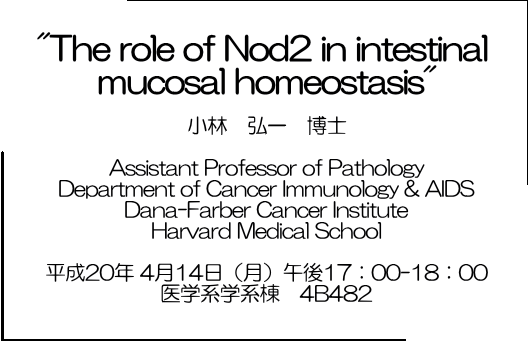|

The normal adult
intestinal tract harbors large numbers of bacteria. The interaction between
bacterial flora and the intestinal mucosal immune system causes continuous
inflammation, which is well controlled in the healthy intestines. The recognition
of commensal bacteria by the gut mucosal immune system is mediated by pattern
recognition receptors. There are at least two different classes involved; one
is the cell surface receptor class of Toll-like receptors (TLRs) and the other
consists of cytoplasmic proteins composed of NBD and LRR domains (NRL family
proteins). We have shown that one of these NLR proteins, Nod2, detects a
bacterial cell wall component in vitro and in vivo and plays a significant role
in the activation of host protection mechanisms in the intestine. Nod2 plays an
important role in the activation of the adaptive immune system as an adjuvant
receptor. Nod2 has been mapped to the IBD1 locus and loss of function mutations
in Nod2 have been shown to be related to Crohnfs disease, an inflammatory
disease of the intestine. Therefore, Nod2 is a critical innate immune molecule
which regulates intestinal mucosal homeostasis.

1. Kobayashi K, et al. RICK/Rip2/CARDIAK mediates signalling
for receptors of the innate and adaptive immune systems. Nature 2002; 416:
194-9.
2. Kobayashi K, et al. IRAK-M is a negative regulator of
Toll-like receptor signaling. Cell 2002;110: 191-202.
3. Kobayashi KS, et al. Intracellular debugging. Nat. Immunol2003; 4:652-654.
4. Kobayashi KS, et al. Nod2-dependent regulation of innate
and adaptive immunity in the intestinal tract. Science 2005 ;307:731-4.
5. Wilmanski J. M., Petnicki-Ocwieja T., Kobayashi, K. S. NLR proteins:
integral members of innate immunity and mediators of inflammatory diseases.
J. Leukoc Biol. in press
|





![]()